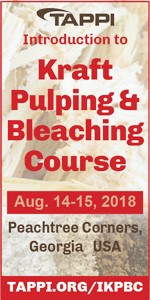| |
 · www.tappi.org
· www.tappi.org
· Subscribe
to Ahead of the Curve
· Newsletters
· Ahead
of the Curve archived issues
· Contact
the Editor

|
|
|
|
How Rolland Uses Sustainability to Spread the Word About Paper
RENEE YARDLEY
When it comes to the modern office, many people think going "paperless" is one way to reduce their environmental impact and save money. On closer examination, however, paperless is not necessarily a realistic or a "greener" option; in fact, a careful approach to paper sourcing can be better—not only for our planet, but for a company's bottom line.
For example, McDonald's ambitious 2025 goal of making recycling available at all locations also includes an aim to source all packaging from recycled, renewable or certified sources, which promotes responsible management of the world's forests. The Financial Post quoted Tom Murray of the Environmental Defense Fund, a partner in the project, as saying such initiatives are good for the environment and the bottom line: "When McDonald's began their waste reduction efforts nearly 30 years ago, the business and environmental benefits were immediate: the company saved an estimated US$6 million a year."
This shows that, now more than ever, the general and informed public are looking to CEOs and business leaders to take the lead on important issues, over governments—especially in paving the way to a more sustainable world. According to the 2017 CSR Study, 63 percent of Americans believe business will take the lead to propel social and environmental change moving forward, and 87 percent will purchase a product because a company advocated for an issue they cared about.
Rolland, a leading North American fine paper manufacturer, has noticed that its green-minded customers—including Patagonia, Cirque du Soleil, Burton, LUSH and others—are increasingly realizing the potential ROI of switching to sustainable supply practices. Here are some important things to keep in mind when communicating the value of recycled paper.
1. The environmental impacts of digital information storage
Two Sides, an organization that provides information about print media's sustainability, explains that information people don't print on paper gets stored in data centers, which consume significant amounts of energy, often from fossil fuels.
In a 2014 study, the Natural Resources Defense Council found that data centers are one of the largest and fastest growing consumers of electricity in the United States. In 2013, US data centers consumed an estimated 91 billion kilowatt-hours of electricity—which is enough to power all the households in New York City twice over—and are on track to reach 140 billion kilowatt-hours by 2020.
Additionally, data centers' environmental impact goes beyond greenhouse gas emissions, with e-waste from batteries and coolant, its impact on the ozone layer and toxic cleaning materials adding to the mix. Discarded components of the world's digital communications infrastructure are polluting drinking water and harming ecosystems around the world. Most e-waste ends up in landfills, where toxic metals leach into the environment.
2. How recycled paper is truly sustainable
On the other hand, paper is one of the few truly sustainable products and accounts for about half of all recyclables collected in the US, according to the EPA. It is estimated that a paper fiber can be recycled seven times. Beyond that, printing on recycled paper rather than virgin paper eliminates the resource utilization and environmental impacts related to forestry, landfilling waste paper, and the production of paper from virgin pulp. The latter is also more water intensive than the production of deinked recycled fiber.
In addition to reducing the amount of waste sent to landfills, recycling paper cuts the production of landfill methane from decomposing waste, a major contributor to climate change. This alone has avoided the creation of more than 20 million metric tons of CO2 equivalents a year in the United States (2014 figure for the American Forest & Paper Association, representing most of the industry).
At Rolland, we conduct and fully publish a Life Cycle Assessment (LCA) to gauge the environmental footprint of our papers. An LCA provides scientific proof behind the manufacturing of our products. It helps us measure and reveal the environmental impacts of our processes to better develop sustainability programs and make decisions that affect long-term results for our business and our customers.
3. Customers value sustainability
Based on the feedback we've received, our customers often choose us not only for the sustainable benefits of our paper, but also for the sustainable way in which we make our paper. We're a key link in their larger sustainable supply chain. Studies show consumers are willing to spend more on a product if it comes from a sustainable brand; they expect their favorite companies to practice business sustainably and ethically, and to make public declarations of their corporate citizenship.
Rolland takes sustainably to heart. Our production is manufactured to the highest environmental standards, and the company has one of the smallest environmental footprints in the North American pulp and paper industry. Our products are made using renewable energy, primarily biogas, and our recycled fibers are deinked without chlorine.
Some of Rolland's customers, like Patagonia, have attested to the merits of using recycled papers. As a part of its sustainable supply chain, Rolland's recycled paper has helped Patagonia to communicate with customers, while living up to its commitment to inspire and implement solutions to the environmental crisis.
At Rolland, we believe that recycled paper can be a gateway to sustainability for businesses, and we hope to make it possible for our customers to have a clear understanding of how recycled paper products can fit into a broader environmental management program. High-quality, recycled paper can and should be a part of any plan to take better care of the planet.
Renee Yardley is vice president of commercial sales, Canada and North American marketing at Rolland.
For a modest investment of $174, receive more than US$ 1000 in benefits in return.
Visit www.tappi.org/join for more details. |
|



